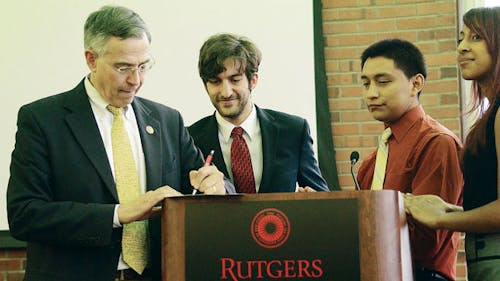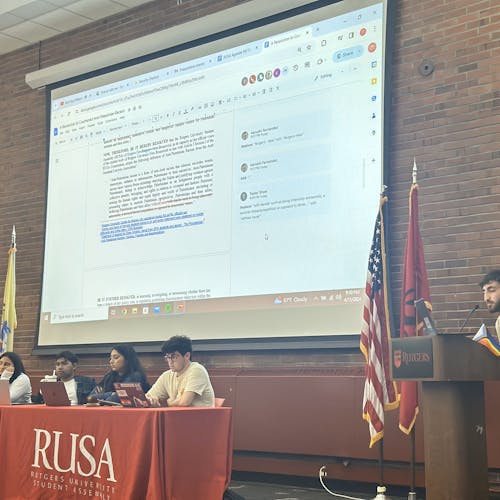Rush Holt prioritizes education, endorses U. students’ agenda

The United States needs to make sure it out-educates and out-produces the rest of the world, a goal that can only be accomplished with a leading higher education system, said Congressman Rush Holt, D-N.J.
“There is a lot at stake right now in the election at hand,” Holt said yesterday during a Rutgers University Student Assembly Town Hall meeting. “We shouldn’t make higher education less affordable [and] less accessible.”
Holt has a track record of encouraging student civic engagement and fighting for higher education, said Pam Navrot, RUSA legislative affairs committee chair.
He co-wrote a bill earlier this year that prevented student loan interest rates from doubling from 3.4 to 6.8 percent, she said.
Navrot, who pushes for increased civic engagement on campus, said University students are informed but do not know how to be involved.
“RUSA cares,” she said. “We want to give you a platform where you can meet these officials.”
Aside from there being a general student interest in higher education, it is important for investing in the United States’ future, Navrot said.
The GI Bill was an investment that made sure millions of soldiers returning from the Vietnam War could attend college, Holt said at the Student Activities Center on the College Avenue campus.
“We produced the workforce that was the envy of the world,” Holt said. “It brought us decades of increased productivity ... and quality of life.”
Whether one is talking about public or private money, there is such a thing as investment, he said, though economists argue about the rate of return on investments.
The price of education has gone up faster than the general cost of living, he said.
“Higher education is more expensive in personnel and facilities than it ever was,” Holt said.
Price controls will not work, but no one has to come up with a good strategy to lower the cost of tuition without using subsidies, he said.
While most colleges use banks as a middleman to handle student loans, the University goes direct with their loans, he said.
“You end up saving, over a period of years, about $50 to $60 billion dollars,” he said. “If we aren’t successful in keeping [tuition] low, [interest rates] will double again in the future.”
If the interest rates double in the future, more than 100,000 New Jersey students would have to pay an additional $115 million in interest payments, Holt said.
Some legislators think an interest rate increase would be beneficial, as it would increase state revenue so tax rates would not have to be raised for higher income residents, he said.
“It really is that trade-off, your education versus millionaires’ tax rates,” he said.
Holt said he has heard that increased availability of student loans had led to tuition increases. Some for-profit institutions have taken advantage of the increase in student loan availability, but most institutions do not factor loan availability into tuition rates.
“I don’t buy into that,” he said. “This is not just simple supply and demand.”
Holt said the Building Our Future Bond Act on the ballot would combine with an additional amount to create more than $750 million for capital education improvements.
Holt said he supports a grace period for graduating students and has already cosponsored legislation to allow students to declare bankruptcy.
“I put a priority on higher education,” he said.
Holt said the U.S. government needs to invest in renewable energy to increase its economic profitability and impact around the world.
The United States uses a lot of energy, so the first step is to build more efficiency into its way of production, transportation and industry, Holt said.
In some regions of the country, he said wind turbines are cheaper or competitive with coal prices.
“It doesn’t mean hardship. It doesn’t mean loss of goods and services,” he said. “Our wasteful ways of using energy don’t give us a better quality of life.”
The sooner the United States reaches profitable sustainability, the more opportunity it has to sell the technology to the rest of the world and grow economically, he said.
“Facing up to climate change needn’t be a hardship. It can easily be an opportunity,” he said.
Funding for higher education should be more of a priority among legislators, Navrot said, because furthering one’s education is not only for personal gain.
“In the process of getting a good job, you’re educating yourself, enriching the community and increasing the socioeconomic status around you,” she said.
Holt endorsed a platform set forth by United States Student Association, the oldest national student organization in the country, which supports a 12-month grace period before Stafford loan payments are due.
National USSA board of directors members Bryan Miranda, Navya Lakkaraju and Spencer Klein presented Holt the agenda, which called for a pledge to support higher education.
Navya Lakkaraju, a School of Arts and Sciences senior, said the six-month grace period was removed a couple of years ago, but should be reinstated and extended to protect graduating students who are in a crucial transition period.
Graduates struggling to pay their student loans should be allowed to declare bankruptcy, she said.
USSA also supports the DREAM Act, which gives a path to citizenship to people not born in the United States but who have lived here most of their lives, Klein said.
The assembly also supports a minimum wage raise to help recent graduates afford their student loan payments, he said.
“Students need to start paying off their federal loans right after they graduate,” said Klein, a School of Arts and Sciences senior.
Students are tasked with finding a job or going to graduate school, but Stafford loans are not deferred for grad school, Klein said.
Out-producing the rest of the world will only happen if everyone can get an advanced degree, something that is increasingly difficult to achieve, he said.
“It’s really great to know that I’m represented by a congressman who understands the importance of education,” Klein said.



